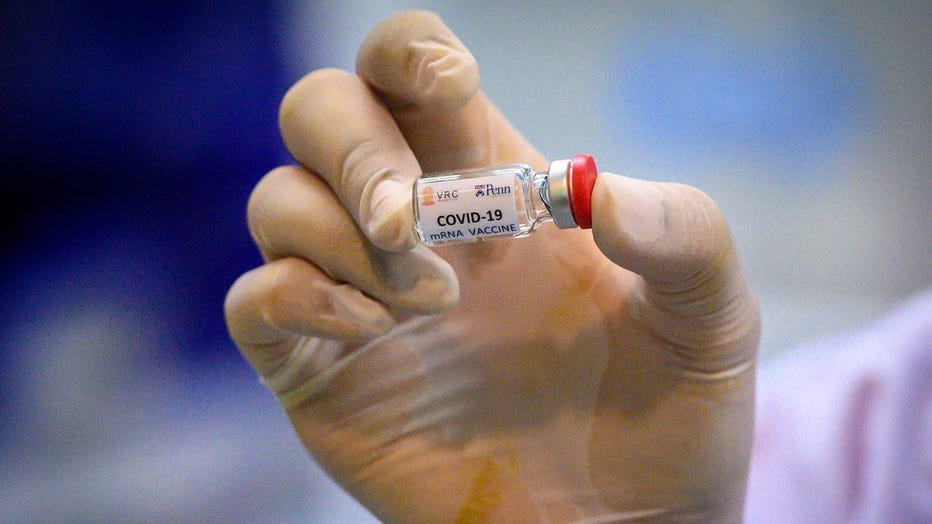CDC tells states to prepare for COVID-19 vaccine distribution as soon as October or November
LOS ANGELES - The U.S. Centers for Disease Control and Prevention has notified public health officials in all 50 states to begin planning and preparing to distribute a potential vaccine as soon as October or November.
Documents sent to the states by the CDC were first posted by The New York Times, and the CDC confirmed to FOX TV Stations their authenticity.
The CDC plan laid out specifications for a potential vaccine, including requirements for distribution, storage and administration.
"For the purpose of initial planning, CDC provided states with certain planning assumptions as they work on state specific plans for vaccine distribution, including possibly having limited quantities of vaccines in October and November," a spokesperson with the CDC told FOX TV Stations.
A CDC document said that for most vaccines, two doses separated by either 21 or 28 days will be needed for immunity and second-dose reminders for patients will be necessary.
RELATED: FDA chief says he could approve COVID-19 vaccine before completion of Phase 3 clinical trials
Operation Warp Speed, the federal government’s expedited mission to create and distribute a vaccine, aims to deliver 300 million doses of a safe, effective vaccine for COVID-19 by January 2021.
Of the six pharmaceutical companies given money to develop a vaccine, two of those companies, Pfizer and Moderna, are in Phase 3 clinical trials, and each company is giving two doses — spaced out a month apart — to participating individuals.
“Many COVID-19 vaccine candidates are in development, and clinical trials are being conducted simultaneously with large-scale manufacturing. At this time, we don’t know which vaccines will be approved,” the CDC said.
The CDC documents also outlined the prioritization of particular populations for COVID-19 vaccination. The focus initially will be on the critical workforce that provides health care and maintains essential functions of society, along with staff and residents in long-term care and assisted living facilities.

This picture taken on May 23, 2020 shows a laboratory technician holding a dose of a COVID-19 novel coronavirus vaccine candidate (MLADEN ANTONOV/AFP via Getty Images)
In an interview with the Financial Times, Food and Drug Administration Commissioner Dr. Stephen Hahn said a potential emergency use authorization for a coronavirus vaccine before the completion of Phase 3 clinical trials would be “appropriate” if his agency found that the benefits outweighed the risks.
“It is up to the sponsor [vaccine developer] to apply for authorization or approval, and we make an adjudication of their application,” Hahn said. “If they do that before the end of Phase 3, we may find that appropriate. We may find that inappropriate, we will make a determination.”
But any potential FDA emergency use authorization of a vaccine does not necessarily mean that the vaccine will be widely available by late October or early November.
“Limited COVID-19 vaccine doses may be available by early November 2020, but COVID- 19 vaccine supply will increase substantially in 2021,” the CDC documents stated. “COVID-19 vaccination program plans must be flexible and accommodate multiple scenarios based on what we’ve heard from vaccine manufactures,” the CDC said.
The new CDC guidance is the country’s latest sign that officials are moving toward finding a vaccine quickly. The U.S. has invested billions of dollars in efforts to quickly develop multiple vaccines against COVID-19. But public fears that a vaccine is unsafe or ineffective could be disastrous, derailing the effort to vaccinate millions of Americans.
In a poll by Gallup released Aug. 7, as many as one in three Americans said they would not get a vaccine for COVID-19 — even if the vaccine were FDA-approved and free of charge. According to the poll, 65% of participants said they would and 35% said they would not.
“For a two-dose vaccine, people will need to make two vaccination visits in a month. This might mean time away from work or other obligations, depending on where and when they can be vaccinated,” Kelly Moore, the associate director for immunization education with the Immunization Action Coalition, said.
CDC Director Robert Redfield said Wednesday that his agency is preparing for a coronavirus vaccine to be available before the end of the year.
"We're preparing earnestly for what I anticipate will be reality... that there'll be one or more vaccines available for us in November, December, and we have to figure out how to make sure they're distributed in a fair and equitable way," Redfield said during an interview with Yahoo Finance.

